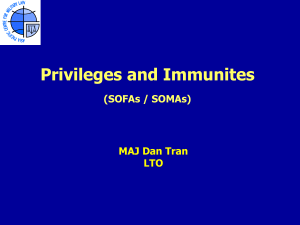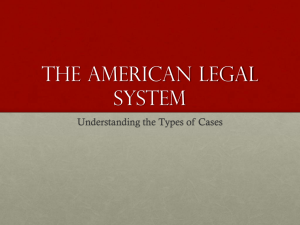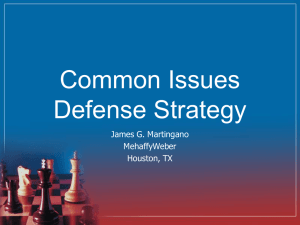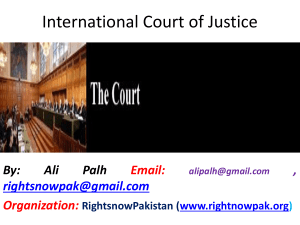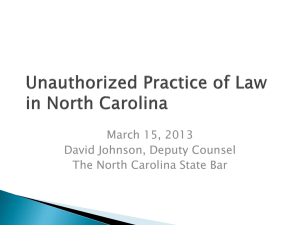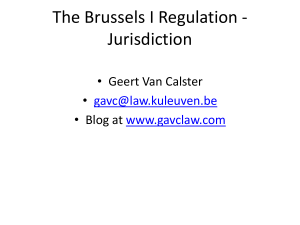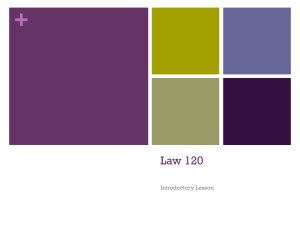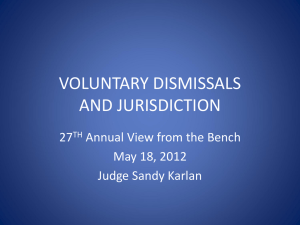IntLawPowerpointsCh4.. - Pleasant Valley Music
advertisement
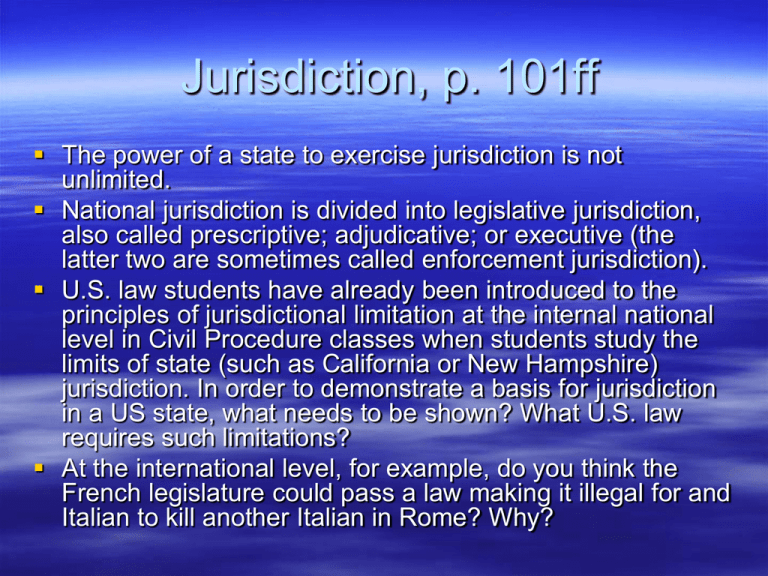
Jurisdiction, p. 101ff The power of a state to exercise jurisdiction is not unlimited. National jurisdiction is divided into legislative jurisdiction, also called prescriptive; adjudicative; or executive (the latter two are sometimes called enforcement jurisdiction). U.S. law students have already been introduced to the principles of jurisdictional limitation at the internal national level in Civil Procedure classes when students study the limits of state (such as California or New Hampshire) jurisdiction. In order to demonstrate a basis for jurisdiction in a US state, what needs to be shown? What U.S. law requires such limitations? At the international level, for example, do you think the French legislature could pass a law making it illegal for and Italian to kill another Italian in Rome? Why? Bases for State Jurisdiction In order for a State to exercise jurisdiction, there must be one, or more of the following jurisdictional bases: Territorial; Nationality; Passive Personality (victim nationality) in limited circumstances; Protective; or Universal. We shall study each of these bases. The Territorial Principle When persons, organizations or activities are within a state’s territory then that state can legislate, adjudicate and enforce its regulations with respect to those persons, organizations or activities. The difficult cases arise when a state tries to regulate persons, organizations or activities located outside the state when the state determines that those entities or activities have an effect within the state. For example, when OPEC sets the price of oil, the price set for oil has a world wide effect. Does that mean that every nation can regulate the activities of OPEC? U.S. v. Aluminum Co. of America Limited (a Canadian corporation) U.S. Ct of Appeals 1945 What acts, in general does the U.S. Sherman Act prohibit? Describe the “Alliance” that the Canadian Aluminum Company had formed. What was the 1936 agreement designed to do? Why did the court decide that the activities of the Alliance were in violation of the Sherman Act? Do you think that the Canadian, French, German, Swiss and British companies, who had formed a company in Switzerland, and who met in Europe to decide upon their trading policies should be subject to US law, in light of the fact that the laws of their own countries did not prohibit what they were doing? The Nationality Principle The state may assert jurisdiction over a person or entity on the basis of nationality, even if the person or entity happens to be outside the state of citizenship. If you are a US citizen, which US laws apply to you, because you are a US citizen, even when you are outside the US? If you are citizen of another country, which laws of your country apply to you even when you are outside your own country? Passive Personality (Victim Nationality) Jurisdiction This basis of jurisdiction permits the state to assert jurisdiction based on the nationality of the victim of the acts prohibited but it is only permitted in limited circumstances. For example, the U.S. could not assert jurisdiction over the usual type of criminal murder of a US citizen that took place outside the U.S. Nor could China assert jurisdiction over the murder of a Chinese citizen that occurred in Paris or New York. If, however, a plane with U.S. passengers was hijacked, the US could make the hijacking illegal under its law, even though the criminal was not a U.S. citizen and the hijacking had not occurred in the US. Similarly, China could prohibit and prosecute such activities where some of the passengers were Chinese even though all of the activities occurred outside China and the perpetrator was not Chinese. The question of getting hold of the perpetrator is a different issue. Merely because a state has a good basis for the assertion of jurisdiction, that does not give the state the right to enter another country and capture the alleged perpetrator. U.S. v. Fawaz Yunis, a/k/a Nazeeh U.S. Ct. of Appeals 1991 What was it alleged that Yunis had done? How did Yunis end up in the US? Why didn’t the method of Yunis’ capture defeat the court’s jurisdiction? What was the basis for US jurisdiction? Which other nations could have tried Yunis? How broad is passive personality jurisdiction? The Protective Principle Certain activities may be perceived as threatening the security of the state and thus the state may prohibit such activities even if they are carried on outside the state by non-nationals of that state. For example, using the protective principle, Sweden could pass laws prohibiting counterfeiting of the krona by anyone, anywhere in the world. (Note: the mere fact that a state has legislative jurisdiction to prohibit an activity outside the state DOES NOT permit that state to capture the alleged criminal unless the criminal is within the state or unless the state can otherwise get personal jurisdiction over the person, such as through an extradition treaty. ) US v. Bin Laden U.S. District Ct 2000 What had the defendants allegedly done? Why did the court determine that the acts and persons were within the permissible scope of US jurisdiction? (and that the legislation prohibiting such acts was intended to reach foreign persons carrying out activities in foreign states?) The Universality Principle All the other bases of state jurisdiction require some sort of connection with the state asserting jurisdiction. Some activities are considered so evil that the international community has waived the usual requirement of a connection with the forum state and has permitted any state that gets hold of the alleged perpetrator of such acts to try the person, even though the acts did not occur in the state’s territory, the person is not a national of that state, the victims are not nationals of that state and the state’s security is not threatened by the activity. The types of activities that permit universal jurisdiction are genocide, war crimes, crimes against humanity, torture, slavery, piracy, operating a stateless vessel. A-G of Israel v. Eichmann Judgment of the Supreme Court of Israel (1962) How did Israel get personal jurisdiction over Eichmann? Run through all of the possible bases of jurisdiction that Israel might have asserted to establish jurisdiction over Eichmann for the murder of Jews and others occurring in Europe during WWII (1939-45). Which, if any, of these bases do you find convincing? Why did the court refuse to decline jurisdiction on the basis of Israel’s violation of Argentina’s sovereignty? Why shouldn’t the remedy for that violation run to the defendant? Which other countries might have had a better basis for trying Eichmann? Would they have provided a better forum? Arrest Warrant Case (Congo v. Belgium) 2002 I.C.J. 3 What crimes did the arrest warrant issued by Belgium accuse Yerodia of committing? What was the basis for Belgium’s assertion of jurisdiction over Yerodia? Who was Yerodia and where did his alleged crimes take place? Against whom were the alleged crimes committed? The ICJ upheld the right of immunity for Yerodia (see the ICJ immunity decision at pp. 164ff.) so it did not discuss the basis of Belgium’s jurisdiction, although several separate opinions did so. Arrest Warrant Case: Joint Separate Opinion of Judges Higgins, Kooijmans & Buergenthal These judges thought the Court should have ruled on the legitimacy of Belgium’s jurisdiction before considering the issue of immunity and noted that the arrest warrant must have been based on universal jurisdiction as the Belgian legislation permits the assertion of universal jurisdiction for serious violations of international humanitarian law (the laws of war) without any connection to Belgium. Other states’ legislation for prosecuting war crimes requires some connection with the forum or indicates which treaty must have been violated. Case law also requires a connection with the forum or a treaty violation. The Geneva Conventions require prosecution or extradition of persons found within their territory accused of grave violations of the Conventions. Q: Must the accused be in the territory of the state asserting jurisdiction to validate universal jurisdiction? Had Belgium actually asserted jurisdiction by issuing an arrest warrant or was it simply preparing to assert jurisdiction? Arrest Warrant Case: Joint Separate Opinion of Judges Higgins, Kooijmans & Buergenthal continued Q: Are these judges endorsing universal jurisdiction or not? If so, in what circumstances? Note: In 2003, Belgium restricted its jurisdictional statute after some members of NATO threatened to call for moving the HQ of NATO out of Brussels. Q: What does this hostility to, or reluctance to address the legitimacy of, universal jurisdiction teach us about that basis for jurisdiction? Extradition What is extradition? Does it require a treaty? US v. Alvarez- Machain, 504 U.S. 655 (1992) What was it that A-M was alleged to have done? How did A-M come to the US? Why didn’t the US use the US-Mexican extradition treaty to get custody of A-M? What is the rule of specialty? What was A-M’s central argument? Why didn’t that argument work? Do you agree with the Court’s interpretation of the USMexican extradition treaty? Why did Justices Stevens, Blackmun and O’Connor dissent? Q: If you represented State X that had an extradition treaty with the US with essentially the same language as the USMexican treaty, what language would you want inserted into a revised treaty? Immunity from Jurisdiction: Diplomatic Immunity: Read The Vienna Convention on Diplomatic Relations, Epps, Doc. Supp. p. 127ff Why give diplomats immunity at all? How broad is diplomatic immunity under the Convention? See VCDR arts. 23, 29,31, 39(2). What if an ambassador murders someone while s/he is serving as ambassador abroad? What can the host state do? See VCDR arts. 9, 32(1). What about the embassy buildings, the diplomatic papers and the diplomatic bag? See VCDR arts. 22(1), 24, 27, 30. Should the scope of diplomatic immunity be narrowed? If so, how? US Diplomatic and Consular Staff Case (U.S. v. Iran) 1980 I.C.J. 3 What happened to give rise to this case? Why was Iran responsible for the actions of the students? Which provisions of the VCDR (and the VCCR) were found to have been violated by Iran? Why did the Court not accept Iran’s argument that US interference in the internal affairs of Iran (allegedly through the CIA’s engineering the overthrow of the government headed by Dr. Mossadegh in 1953 and then substituting the Shah) justified the embassy and consulate seizures? Knaab [representative of Waltrick’s estate] v. Republic of Georgia U.S. District Court 1998 If a foreign diplomat commits a serious crime, can the host state ever prosecute the diplomat? Who was Makharadze? How was it possible that he had been convicted of crimes in the U.S.? What is the gist of Knaab’s complaint? Why did the court dismiss the complaint even though Makharadze was no longer a diplomat and the Republic of Georgia had waived his immunity for the criminal case? Case Concerning Armed Activities on the Territory of the Congo (Democratic Republic of Congo v. Uganda) 2005 I.C.J.--- (Uganda’s second counter-claim) What was Uganda’s claim? Does the VCDR apply during armed conflict? Does this make sense? How could Uganda represent the claims of both Ugandan citizens and noncitizens? Consular Immunity Read the Vienna Convention on Consular Relations, Epps Doc. Supp. p. 141ff How is the scope of consular immunity different from the scope of diplomatic immunity? Could a consular officer be prosecuted for murder or drug dealing if the consul’s state refused to waive his/her immunity? Head of State and Other Ministers’ Immunity Regina v. Bow Street Magistrates Ex Parte Pinochet, House of Lords, UK 1999 Who was Pinochet? How did he get to the UK? What did Spain have to do with the case? What crimes did Spain accuse Pinochet of committing? What was the basis for Spain’s jurisdiction? Is such a basis for jurisdiction a good idea? Head of State and Other Ministers’ Immunity Regina v. Bow Street Magistrates Ex Parte Pinochet, House of Lords, UK 1999 continued What is an extradition treaty? What is the double criminality principle in extradition treaties? How does the UK apply the double criminality provision? What was the scope of immunity accorded to Pinochet? What law establishes this immunity? Finish this sentence: The UK court upheld immunity on all claims against Pinochet except…………because………… Why was Pinochet never sent to Spain? Pinochet died in 2006 before the Chilean cases were concluded. Arrest Warrant Case (D.R.Congo v. Belgium) 2002 I.C.J. 3 What crimes was Yerodia alleged to have committed? On what basis did Belgium assert jurisdiction over Yerodia? Finish this sentence: The Court upheld immunity from Belgian jurisdiction for Yerodia because ………. On what sources of law did the Court rely? Arrest Warrant Case (D.R.Congo v. Belgium) 2002 I.C.J. 3 continued Why was Belgium not permitted to be a persistent objector? Why did the ICJ not find the statutes of Nuremberg, the ICTY, ICTR and ICC, which accord individual culpability to persons even if they hold high government positions, persuasive? Suppose Belgium wanted to try Yerodia for torture occurring before he became FM. Would he still have immunity? When would his immunity cease? If the Pinochet case came before the UK or any other national courts today, do you think that the Arrest Warrant Case would require the court to accord Pinochet immunity? What remedy did the Court order? There is a blistering dissent in this case by Judge ad hoc Christine Van den Wyngaert. Immunity of International Organizations Before a major international organization, particularly a governmental international organization, will be willing to locate offices or headquarters within a particular state, the organization will want to enter into a treaty with the host state spelling out certain immunities from the jurisdiction of the host state for persons employed by the organization or traveling to the organization to take part in its activities. For example, the U.S. has such a treaty with the United Nations regarding the UN headquarters in New York. Sovereign Immunity and The Act of State Doctrine What is Absolute Foreign Sovereign Immunity and What is Restrictive Foreign Sovereign Immunity and what theory underlies these concepts? What view of foreign sovereign immunity in US courts is favored by Legal Adviser Tate? Why does he take this position? Many developed states now have legislation governing the scope of immunity for foreign sovereigns in their courts. For example the U.S. Congress has passed The Foreign Sovereign Immunities Act of 1976 which adopts the restrictive theory of foreign sovereign immunity. What is The Act of State Doctrine? Problem p. 177-178 First read The Nottebohm Case (Liechtenstein v. Guatemala) 1955 I.C.J.4 at pps. 270-275. Then read the problem on pps. 177-178. Next, answer questions 1 and 2 on p. 178.
